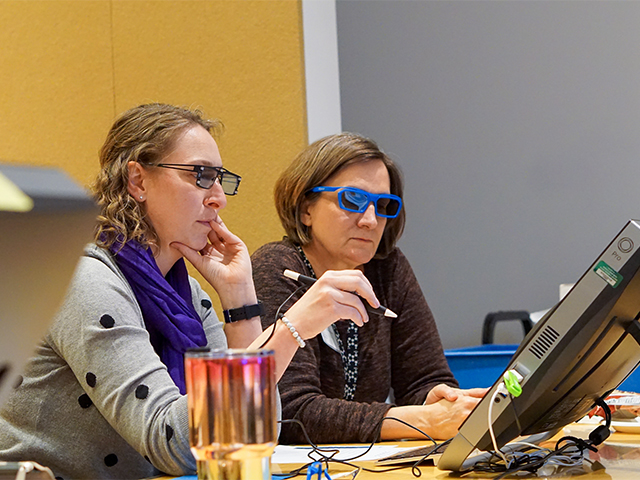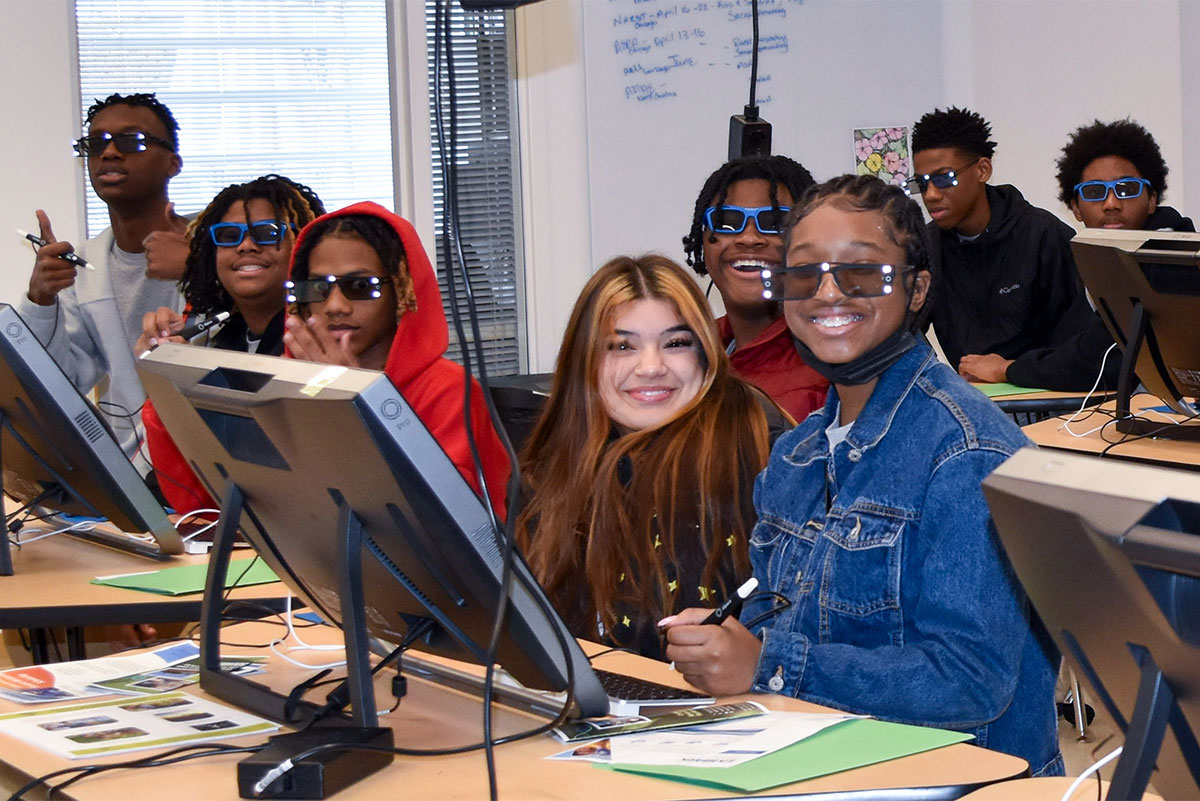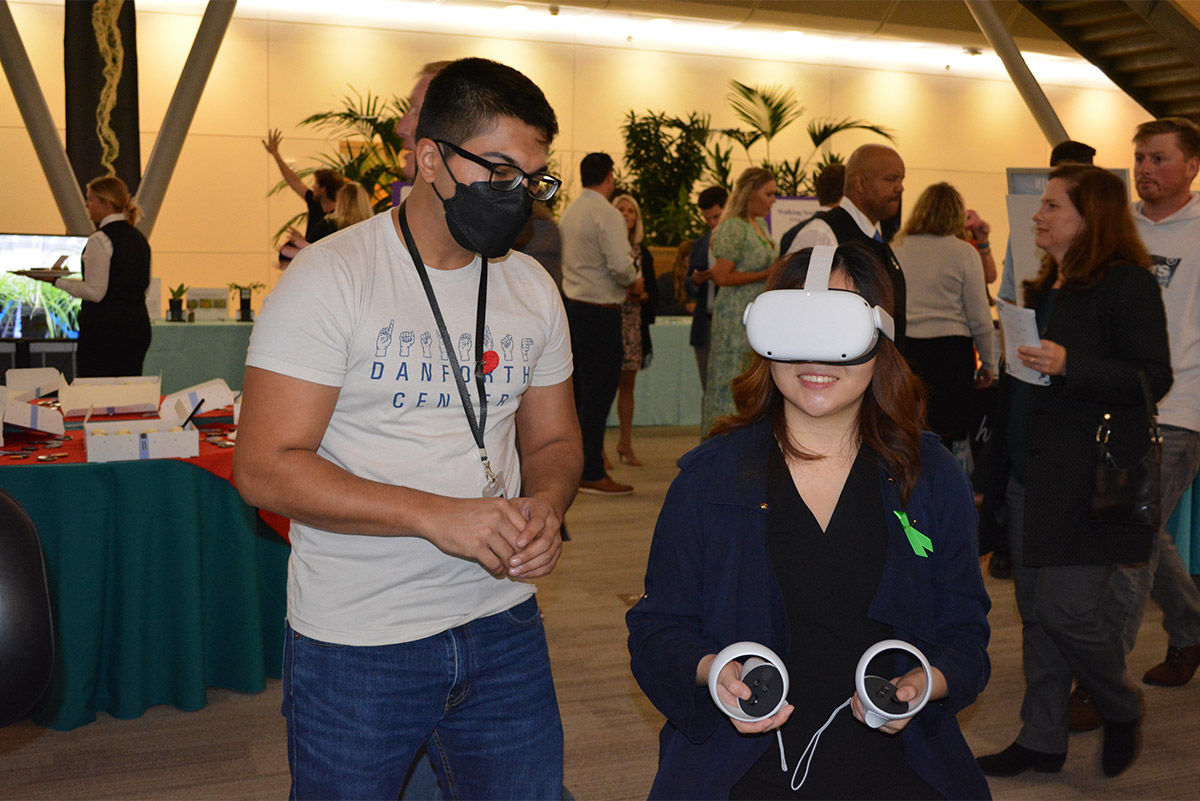Deploying Emerging Technologies to Revolutionize STEAM+Ag Education
As technology rapidly advances, bridging the gap between traditional learning methods and emergent technologies has become imperative to inspire the next generation of STEAM+Ag® scientists. The Education Research and Outreach Laboratory (EROL) at the Donald Danforth Plant Science Center has embarked on a groundbreaking journey with its Education Technology Program (ETP), revolutionizing STEAM+Ag education through immersive experiences and emergent technologies.
Launched in 2019 with funding from the National Institute of Food and Agriculture (NIFA) and with current support from the National Science Foundation, the ETP aims to make STEAM+Ag® education accessible to all through engaging experiences leveraging augmented and virtual reality (AVR), 3D modeling and gaming, among other technologies. Students embark on virtual journeys into the world of plant science and agriculture, exploring concepts in ways previously unimaginable or inaccessible to them, closing the digital use and access divide. Led by Sandra Arango-Caro, PhD, with support from five team members, the program focuses on four main approaches to building capacity in educational technology.
Professional Development Workshops for Educators
The ETP professional development workshops offer educators STEAM+Ag curriculum delivered through emergent technologies. Participants receive training in the use of these technologies, and, through a loan-rotation system, our equipment is used across educational institutions.
Collaborating with industry leaders like zSpace, the ETP facilitates training and learning through augmented reality technology, where digital elements overlay onto the real world. Our lab currently has eight zSpace AIO computers with a variety of pre-made lessons in plants and agriculture.
So far, more than 50 educators from Missouri, Illinois, and beyond have benefitted from the Education Technology Program’s professional development workshops.
These professional development workshops also introduce educators to virtual reality technology using head-mounted devices, where 3D computer-generated simulations replace real-life environments with simulated ones. Our lab has created the virtual experience “The Soybean Saga to Food and Climate Security,” available for download here, where students can visit four virtual exhibits that cover different aspects of plant biology, agriculture and research at the Danforth Center guided by Soybean, the main character and host.
Educators receive training on how to facilitate curriculum using 3D modeling, a tool that allows students to integrate science, art, design and technology through the creation of 3D models.
By familiarizing educators with new technologies, EROL creates opportunities for teachers to learn about new technologies and share their knowledge with students. "I like to give the students authentic projects that are tied to real-world scientific research," said one educator from the Parkway and Rockwood School Districts’ Spark! Program. The technology featured in these workshops is actively used in modern science and is a vital part of education for students interested in pursuing a career in STEM. By equipping teachers with practical knowledge, the workshops enable them to impart valuable insights to the next generation of plant scientists.

Educators receive training on the use of the zSpace AIO computers for augmented reality immersive experiences during one of the Education Technology Program’s professional development workshops.
Immersive Experiences for Students
The ETP also offers immersive experiences that allow middle and high school students to envision what is possible in STEAM+Ag fields. Educators can implement these learning opportunities in formal or informal settings in non-traditional learning environments.
One of the most popular projects addresses the disconnect between science, art, design and technology by introducing high school students to a real-world example of a cross-disciplinary endeavor. Support from the National Science Foundation's Innovative Technology Experiences for Students and Teachers (NSF-ITEST) enables students to collaborate in teams to create 3D models of plants that are the focus of research at the Danforth Center. Students gain scientific knowledge and acquire skills in 3D modeling, science communication, teamwork and problem-solving, among others.
This integration of AR and VR tools allows them to visualize their models in immersive environments, demonstrating the connection between their work and its practical application. The immersive experience includes a visit to the Danforth Center and engaging conversations with our scientists to see what a career in plant science looks like.

Students from the Saint Louis Science Center YES Program learn about plants through augmented reality experiences.
Students reflected on their experiences, “I was able to learn more about how a common plant can contribute a huge importance in our everyday lives.” “I was able to develop my research skills and apply them through the medium of digital design and technology” and “I think digital design can be applicable in many classes as visual models are used in many fields.”
The impact on students is multi-faceted, encompassing gains in content knowledge, real-world connections to science, mastery of scientific skills and the cultivation of a sense of community and ownership over their projects.
The students were involved in a project that was tied directly to research that was happening. They practice working as a team and communicating. They gained experience with a digital application in the field of biology.
Educator from Parkway and Rockwood School Districts' Spark! Program
This spring, the popular 3D plant modeling project will be implemented in two rural schools, Mexico High School in Mexico, MO, and Orchard Farms High School in St. Charles, MO. By collaborating with educators, we are closing the digital use and access divide by bringing this transformative learning experience to urban and rural schools that cannot otherwise access the technology. To date, more than 700 students from 27 institutions have engaged in the ETP’s immersive experiences for middle and high school students.
Public Outreach
Beyond professional development and student learning, the ETP offers engaging, immersive experiences in plant science and agriculture through augmented and virtual reality technologies. More than 2,000 people have participated in events at our facility during high school field trips, externship programs and at public events such as Party with the Plants and Plant Tech Jam. To bring our educational experiences to the public, we have partnered with institutions including the Saint Louis Science Center, the Jackie-Joyner Kersee Food Agriculture Nutrition and Innovation Center, Gateway GIS and more.

A Party with the Plants attendee immerses themselves in the cutting-edge VR technology provided by the Education Technology Program.
Educational Research
In addition to offering educational opportunities to teachers, students and the public, we investigate how we and other educators can most effectively facilitate learning in the rapidly evolving world of STEM to improve the impact of our education programs. Through assessments delivered before and after programming, we examine how productive failure, collaboration, plant awareness, and the integration of science, art, design and technology impact the development of student learning and interest in STEAM+Ag subjects and careers.
All four of these pillars support the Education Technology Program at the Danforth Center as it stands as a beacon of innovation in STEAM+Ag education. By harnessing the power of emergent technologies for education and project-based learning the program empowers students to explore the frontiers of science, art, design, technology and agriculture. As we embrace the digital age, initiatives like these pave the way for a brighter future for all, where curiosity, creativity and collaboration drive scientific discovery and societal progress.